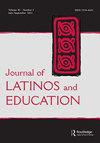Spanish-Speaking Hispanic/Latino Families Education-Related Parental Involvement Practices
IF 1.1
Q3 EDUCATION & EDUCATIONAL RESEARCH
引用次数: 0
Abstract
Under current and prominent definitions, the rates of parental involvement among Hispanic/Latino families have been historically low. However, empirical evidence suggests that parental involvement can be perceived/practiced in varied ways. This work explored these perceptions held by Spanish-speaking Hispanic/Latino families through focus groups (n = 10) and individual interviews (n = 23) with parents of school-age children. Findings suggest that Spanish-speaking parents define parental involvement to include the emphasis of educación (a recognition that children’s moral compasses and respectful behavior are a part of their formal education) and a parent-centered approach (involving the children in the parents everyday life), while navigating language barriers. Both Spanish- and English-speaking parents endorsed low parent-teacher communication and strong educational aspirations for their children. That is, parents expressed wanting their children to have a better life than the lives the parents have experienced themselves. This study offers empirical evidence that Spanish-speaking families are highly involved in their children’s academic development and perceive themselves to play a critical role in their children’s educational success. A shared understanding of values including culturally responsive measures to assess diverse parental involvement practices and adopting a cultural lens among teachers/educators is needed to accommodate diverse cultural parental involvement practices. Study findings can inform policies and practice to help pre-service teachers and educators to understand factors that determine Spanish-speaking families’ engagement in school-based parental involvement.讲西班牙语的西班牙裔/拉丁裔家庭教育相关的父母参与实践
根据当前和突出的定义,西班牙裔/拉丁裔家庭的父母参与率一直处于历史低位。然而,经验证据表明,父母的参与可以以不同的方式被感知/实践。本研究通过焦点小组(n = 10)和对学龄儿童父母的个别访谈(n = 23),探讨了讲西班牙语的西班牙裔/拉丁裔家庭持有的这些看法。研究结果表明,说西班牙语的父母在定义父母参与时,包括强调educación(承认孩子的道德指南针和尊重行为是他们正规教育的一部分)和以父母为中心的方法(让孩子参与父母的日常生活),同时克服语言障碍。说西班牙语和英语的家长都赞同家长与老师之间较少的交流,对孩子有强烈的教育愿望。也就是说,父母表示希望他们的孩子过得比他们自己所经历的更好。本研究提供了经验证据,表明西班牙语家庭高度参与孩子的学业发展,并认为自己在孩子的教育成功中起着关键作用。需要对价值观的共同理解,包括评估不同父母参与实践的文化响应措施,并在教师/教育工作者中采用文化视角,以适应不同文化的父母参与实践。研究结果可以为政策和实践提供信息,帮助职前教师和教育工作者了解决定西班牙语家庭参与学校家长参与的因素。
本文章由计算机程序翻译,如有差异,请以英文原文为准。
求助全文
约1分钟内获得全文
求助全文
来源期刊

Journal of Latinos and Education
EDUCATION & EDUCATIONAL RESEARCH-
CiteScore
2.20
自引率
11.10%
发文量
87
 求助内容:
求助内容: 应助结果提醒方式:
应助结果提醒方式:


